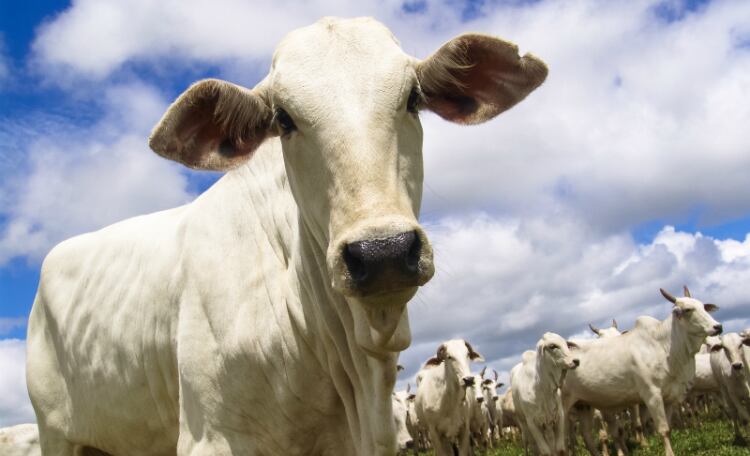World leaders who participated at November’s COP23 (conference of parties) climate summit in Bonn, Germany, were advised by a key investor group to reduce livestock methane if greenhouse gas emissions were to be tackled effectively.
The Farm Animal Investment Risk & Return (FAIRR) initiative released a paper during the event that warned some kind of “livestock levy” or meat tax was needed to tackle climate change.
Indeed, FAIRR analysis said the 10 highest-emitting agriculture sectors, including the US, Australia, Germany and the UK, collectively create emissions equivalent to consuming 1.6 billion barrels of oil. Other negative environmental impacts of the livestock sector included water scarcity, deforestation and biodiversity loss, all of which have indirect impacts on either boosting carbon emissions or removing carbon sinks, according to the FAIRR report. Livestock are therefore responsible for 14.5% of global greenhouse gas emissions (GHGs) according to the Food & Agriculture Organisation (FAO), or around 7.1 gigatonnes of GHG emissions each year.
As for governments that are leading the way in developing such climate change policies, a 2016 report by the Danish Council on Ethics (Det Etiske Råd), an advisory body to the Danish parliament (Folketing), examined whether the choice of consuming foods with a large environmental footprint should be left to the consumer? It asked the parliament to consider whether regulation should be introduced to reduce the climate impact of food consumption – and called for the introduction of a tax on red meat levied on consumers as opposed to producers.

EU members mull meat tax
Last year, green opposition party The Alternative put forward a follow-up proposal for a Danish meat tax of DKK17 (US$2.70) per kg of beef. Politicians have rejected both proposals thus far, but the debates have raised public awareness of the issue and policymakers have agreed “action is needed to lower meat consumption if commitments under the Paris Agreement are to be met”, said the FAIRR report.
Germany has also faced calls from its federal environment agency to tax all meat and dairy products at the standard 19% VAT rather than the current 7%, suggesting that lower rates of taxation amount to “environmentally harmful subsidies”.
In Sweden, a 2016 Green Party proposal suggested an SEK20 (US$2.40) per kg levy on beef, payable by the consumer. Further motions on the idea are planned.
Also, in Australia, a sum of AU$5 (US$4) is levied against each head of cattle per transaction, the majority of which is paid to Meat and Livestock Australia for programmes including animal welfare, nutrition and environment and sustainability.
California-based non-profit organisation Climate Action Reserve has drawn up greenhouse gas emission offset protocols, including a cap-and-trade offsets programme it describes as a market-based incentive to invest in methane reduction projects at livestock facilities.

Investors 'should not overlook' livestock emissions
FAIRR, whose supporter investors manage more than US$4 trillion in assets participating in its activities, in its white paper, The livestock levy: are regulators considering meat taxes?, released to investors in December, called on financiers to anticipate policy responses from other governments, which – like energy-related emissions schemes – could enable methane-reducing technology providers to tap government subsidies.
At the Bonn summit, founder Jeremy Coller said: “It’s two years since Paris rang the starting bell on the low carbon transition and investors have tended to focus on high-emitting sectors like energy, transport and extractives. Investors should not overlook the livestock sector where some of the biggest climate risks and opportunities exist.”
He added that while early discussions were under way, no developed country had yet mentioned specific plans to tackle livestock emissions in its INDC (Intended Nationally Determined Contribution) towards meeting the Paris targets of keeping global warming below 2°C.
“Too many delegates at COP23 are fluent in low-carbon automotive innovations, yet still rely on cows and pigs as the outdated technology to supply the world’s protein demand,” said Coller. “The next stage of the Paris talks must put cows alongside cars.”
'Practical challenges' for the meat change
The white paper suggested livestock could follow the pathway of carbon, tobacco and sugar in a so-called “behaviour tax” to reduce emissions.
And in its communiqué following the Bonn summit, the UN-supported Climate and Clean Air Coalition said: “The agriculture sector is a significant contributor to the global climate challenge.
“Solutions exist that can reduce emissions while increasing productivity building resiliency, and improving the livelihoods of farmers. We resolve to develop policies and measures to reduce emissions from the agricultural sector and help improve the productivity, resilience and livelihoods of farmers.”
Countries have now been asked to submit their views to the United Nations Framework Convention on Climate Change (UNFCCC) by 31 March 2018, on what should be included in COP discussions looking at “the collective efforts of parties in relation to progress towards the long-term goal” (identified in the Paris agreement of 2015).
“While the concept of a meat tax to improve public health and/or environmental outcomes is currently at an embryonic stage, and faces several practical challenges for how implementation might work, it is on a clear path that is likely to end with taxation in some form,” said the FAIRR paper.
The FAIRR report concluded: “It is highly probably that over the medium to long-term some form of taxation on meat products will be implemented in some jurisdictions.”
If this does happen, it will inevitably be against some stiff opposition. Assistant Professor Tara Felix, a beef specialist in the Department of Animal Science at the Pennsylvania State University, told GlobalMeatNews: “I think many believe it would be challenging if not impossible to pass such a tax.”
And US-based rancher and blogger Amanda Radke is a good example of probable industry opposition. She warned on her The Beef Daily blog: “If this meat tax comes to fruition and our product is lumped in with items like tobacco, carbon and sugar, I’m afraid consumers will no longer be able to afford to eat meat, and the health repercussions may be quite troubling.”
